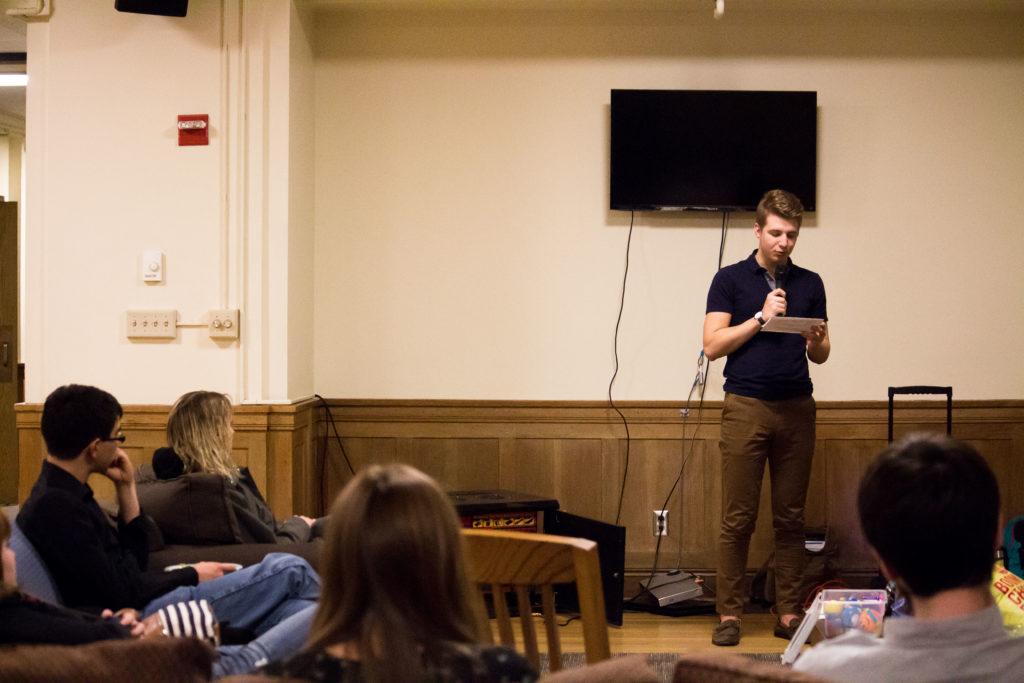On Nov. 29, organizers of the student group National Alliance on Mental Illness (NAMI) hosted an event focused on the destigmatization of mental illness. Participants listened to stories of mental illness, statistics on the prevalence of mental health problems and a brief presentation on some appropriate ways to handle mental illness, either personally or among friends and acquaintances.
“NAMI’s main three goals are advocacy, support and education,” said Rob Marko-Franks ’18, one of the event organizers. “It is all about destigmatization. … We want to fight the stigma and re-define normalcy.”
To help achieve these goals, NAMI collected submissions, many anonymous, from those who have felt the effects of mental illness. Group members read these powerfully personal stories aloud on Wednesday night, waking participants up to the very real mental health struggles around them.
“Mental disorders don’t pick and choose; it can affect anyone,” Marko-Franks said.
The personal impact of mental illness can be viewed not only through personal stories, but also through national statistics. As Marko-Franks pointed out during the event, the National Institutes of Health report that 17.9 percent of Americans — just under one in five — experienced a mental illness during 2015, with the rate somewhat higher (21.7 percent) for those between the ages of 18 and 25. Thus mental illness is highly prevalent and has a large impact. The destigmatization event was designed to spread the word and increase awareness of mental health.
“We’re focused on making sure the student body understands what mental illness is and doesn’t have a stigma about mental illness,” said Nina Galanter ’18, another event organizer.
However, making students aware of mental health issues is only one third of the battle. NAMI seeks to encourage students to act on their awareness and to improve access to and expand mental health resources on campus.
Once students are aware of mental illness, “the best thing is to talk openly about mental health and mental illness, and make sure to be careful with the words you are using,” Galanter said.
Moreover, action can take many forms.
“There are many ways to advocate. The popular image of someone who is an activist is someone who is … spending all of their time devoted to a cause, holding posters and shouting. But that’s not always the case. Sometimes the best thing you can do is to be there for someone in need and speak up for them when they can’t speak up for themselves,” Marko-Franks said.
Just spreading the word, according to NAMI, is a large step in the right direction. Once students have been made aware of and inspired to act on mental health issues, they must be empowered to do so. The third role NAMI hopes to play is in providing access to mental health resources, connecting sources of help to those in need.
“A lot of what we want to do is reach out to different student groups and different resources, and kind of get an idea of the web of resources that are available on campus, and see what’s missing and what’s there, and how we can strengthen it,” Marko-Franks said, citing cooperation with Residence Life staff and with Grinnell’s Psi Chi Chapter as examples of outreach to other groups. “Because there are so many tight knight-groups [on campus], it would be really great to have the conversation going in more places.”
NAMI organizers handed out resource cards, listing both confidential and reporting mental health resources on and off campus. Spreading awareness of these resources, even with continuous repetition, noted organizers, may help save students who cannot take the time to find them anew during a crisis.
As far as the prevalence of mental health resources on campus, there is reason to be cautiously optimistic.
“The College has definitely improved with its mental health services, … but I think that there is still a long way to go, especially in getting access to psychiatrists, for example,” Galanter said. “The college environment is still not the best [environment for] mental health. … Faculty need to be aware of how to adequately support students who have mental illness.”
Even though the college environment can be stressful by its very nature, mental health concerns, according to Galanter, should remain near the top of the list of priorities.
By combining destigmatization with awareness-raising and advocacy, NAMI hopes that it is making strides in the right direction for mental health on campus. The group is cooperating with the Grinnell Psi Chi chapter and SHACS to host a Mental Health Resource Fair from 4 to 5 p.m. today.



































































